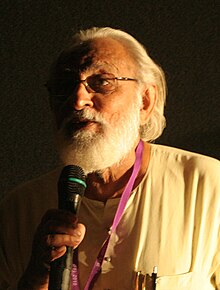Career
He freelanced as an animator in 1952–53. After being unemployed for nearly four years, he got his first salaried job as assistant director to filmmaker Chetan Anand.He worked in theatre as a designer and director, including designing sets and lights for productions of Hindustani Theatre, Okhla Theatre of Habib Tanvir, Kannada Bharati and other groups of Delhi. In films, he has worked as an art director, camera-man, screenwriter, producer and director. His first film. His fas an independent Art director or Haqeeqat, a film by Chetan Anand, which won him recognition and the 1965 Filmfare Award for Best Art Direction. His filmography includes over 15 documentaries and 8 feature films in Hindi, Urdu and Kannada. [2]
His best known work, Garm Hava (Scorching Winds, 1973), is one of the last cinema productions featuring 1950s Marxist cultural activists including Balraj Sahni and Kaifi Azmi. Garm Hava won several Indian national awards in 1974, including a National Integration Award. [3] It was screened in the competitive section at Cannes and was also the Indian entry at the Oscars. It won the Filmfare award for best screenplay. [4]
M. S. Sathyu currently is associated mainly with television and stage. In 2013, Sathyu featured in the popular Google Reunion ad, where he played the role of Yusuf, an elderly Pakistani man who is reunited with his childhood pre-partition friend from India, Baldev (Vishwa Mohan Badola). [5] The commercial went viral on social media. [6] [7] [8] Sathyu is one of the patrons of Indian People's Theatre Association (IPTA). He directed musical play Gul E Bakavali written by Sudheer Attavar; represented 8th World Theatre Olympics in year 2018 . He also directed plays like 'Dara Shikoh', Amrita, Bakri, Kuri, Akhri Shama and many more. In 2014, his debut film, Garm Hava was re-released after restoration.
This page is based on this
Wikipedia article Text is available under the
CC BY-SA 4.0 license; additional terms may apply.
Images, videos and audio are available under their respective licenses.
